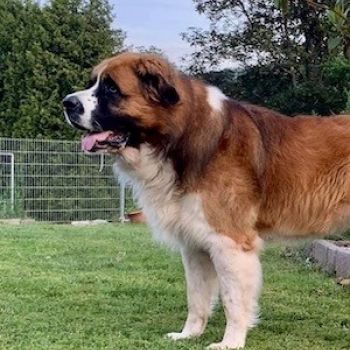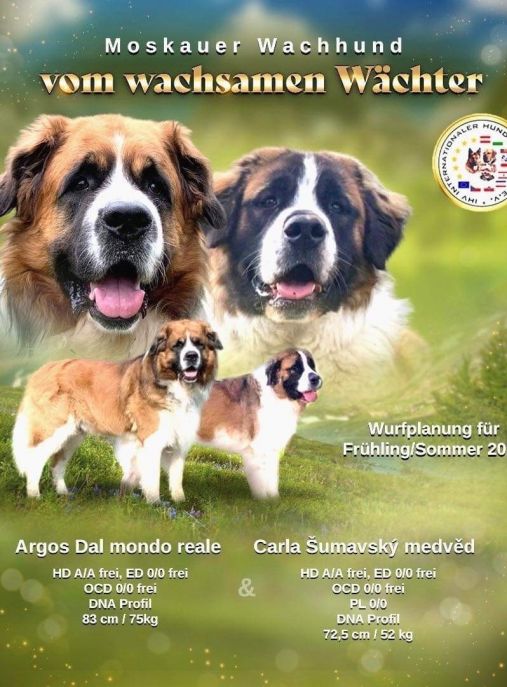Moscow watchdog - the breed description to be published.
The Moscow watchdog, also known as the Moscow guard dog or the Russian bear dog, is a majestic and powerful breed that possesses a unique character. These dogs are renowned for their loyalty, intelligence, and protective nature, making them excellent companions and guardians. Understanding their character, behavior, and training requirements is essential for anyone considering raising a Moscow watchdog.
First and foremost, the character of Moscow watchdog dogs is defined by their unwavering loyalty and devotion to their family. They form strong bonds with their owners and are incredibly protective of them. This breed has a natural instinct to guard and protect, which makes them excellent watchdogs. They are always alert and vigilant, ready to defend their loved ones against any potential threat.
Despite their imposing size and protective nature, Moscow watchdogs are generally gentle and affectionate with their family members. They are known to be great with children, often displaying patience and tolerance towards them. However, due to their protective instincts, early socialization is crucial to ensure they are well-behaved and comfortable around strangers and other animals.
Moscow watchdogs are intelligent dogs that require mental stimulation and consistent training. They are quick learners and respond well to positive reinforcement techniques. Early obedience training is essential to establish boundaries and ensure they understand their role within the family. These dogs thrive in an environment where they have a clear leader and consistent rules to follow.
Proper exercise is vital for the physical and mental well-being of Moscow watchdogs. They are an active breed that requires regular exercise to prevent boredom and destructive behavior. Daily walks, playtime, and interactive toys are excellent ways to keep them engaged and burn off their energy. However, it is important to note that they should not be overexerted, especially during hot weather, due to their thick coat.
Grooming a Moscow watchdog is relatively low-maintenance. Their dense double coat requires regular brushing to prevent matting and to remove loose hair. They shed moderately throughout the year, with heavier shedding occurring during seasonal changes. Bathing should be done as needed, ensuring to use a dog-specific shampoo to maintain their coat's natural oils.
When it comes to raising a Moscow watchdog, it is crucial to provide them with a loving and structured environment. They thrive on routine and consistency, so establishing a set schedule for feeding, exercise, and training is beneficial. Early socialization is key to ensure they grow up to be well-rounded dogs that can confidently interact with various people and situations.
Additionally, it is important to expose them to different environments, sounds, and experiences from a young age. This will help them develop into confident and well-adjusted adults. Positive reinforcement training methods, such as rewards and praise, work best with this breed. Harsh or punitive training techniques can lead to fear or aggression issues.
In conclusion, Moscow watchdogs are loyal, intelligent, and protective dogs that make excellent companions and guardians. Their character is defined by their devotion to their family, their natural guarding instincts, and their gentle nature. Raising and training them requires early socialization, consistent training, and providing them with mental and physical stimulation. With the right care and guidance, a Moscow watchdog can become a loving and loyal member of any family.
The Moscow Watchdog, also known as the Moscow Guard Dog, is a large and powerful breed that requires specific care to ensure their well-being and happiness. Here are some tips on how to care for Moscow Watchdog dogs, including what to do and what not to do:
1. Exercise: Moscow Watchdogs are active dogs that require regular exercise to maintain their physical and mental health. Aim for at least 60-90 minutes of exercise daily, including walks, runs, and playtime in a secure area. However, avoid excessive exercise in hot weather to prevent overheating.
2. Grooming: This breed has a dense double coat that requires regular grooming to keep it clean and healthy. Brush their coat at least once a week to remove loose hair and prevent matting. During shedding seasons, daily brushing may be necessary. Additionally, check their ears regularly for signs of infection and trim their nails as needed.
3. Socialization: Early socialization is crucial for Moscow Watchdogs to develop into well-rounded dogs. Expose them to various people, animals, and environments from a young age to help them become confident and friendly. Enroll them in puppy classes or obedience training to enhance their social skills and obedience training.
4. Training: Moscow Watchdogs are intelligent and eager to please, making them relatively easy to train. Use positive reinforcement techniques such as treats, praise, and rewards to motivate them. Consistency, patience, and firmness are key to successful training. However, avoid harsh training methods or punishment as it can lead to fear or aggression.
5. Diet: Provide a balanced and nutritious diet to support the overall health of your Moscow Watchdog. Feed them high-quality dog food that meets their specific needs, considering their age, size, and activity level. Avoid overfeeding to prevent obesity, which can lead to various health issues.
6. Health care: Regular veterinary check-ups are essential to ensure your Moscow Watchdog's health. Vaccinations, parasite prevention, and dental care should be part of their routine healthcare. Additionally, be aware of breed-specific health concerns such as hip dysplasia, bloat, and heart issues. Regular exercise, a healthy diet, and maintaining a healthy weight can help minimize these risks.
7. Safety: Moscow Watchdogs are protective by nature, so it's crucial to provide a safe and secure environment for them. Ensure your yard is properly fenced to prevent them from wandering off. Supervise their interactions with strangers and other animals, as they may be wary of unfamiliar individuals. Proper training and socialization can help them differentiate between genuine threats and normal situations.
What not to do:
1. Do not leave your Moscow Watchdog alone for extended periods. They thrive on human companionship and may develop separation anxiety if left alone for too long.
2. Avoid using force or physical punishment during training. This can damage their trust and lead to behavioral issues.
3. Do not neglect their exercise needs. Inadequate exercise can lead to boredom, destructive behavior, and obesity.
4. Avoid overfeeding or feeding them a poor-quality diet. This can lead to weight gain, digestive issues, and other health problems.
5. Do not skip regular veterinary check-ups. Early detection of any health issues can lead to better treatment outcomes.
Remember, caring for a Moscow Watchdog requires time, effort, and dedication. By providing them with proper care, training, and love, you can ensure they live a happy and fulfilling life as a beloved member of your family.
The Moscow watchdog, also known as the Moscow guard dog or the Russian bear dog, is a majestic and powerful breed that demands attention wherever it goes. When it comes to their coat color, these dogs exhibit a striking and distinctive appearance that adds to their overall allure.
The common color of Moscow watchdog dogs is predominantly black with splashes of white on various parts of their body. The deep, lustrous black coat serves as a testament to their strength and resilience, while the white markings provide a beautiful contrast, enhancing their regal presence.
Starting from the head, the Moscow watchdog typically boasts a solid black mask that covers the muzzle, giving them an air of authority and intelligence. This mask extends to the ears, which are usually black as well, although some dogs may have white patches or speckles on their ears, adding a touch of uniqueness to their appearance.
Moving down the body, the black coat of the Moscow watchdog is dense and thick, providing excellent protection against harsh weather conditions. The white markings are often seen on the chest, forming a distinct and eye-catching patch that stands out against the dark background. Additionally, some dogs may have white markings on their paws, creating a striking contrast against the black fur.
As the tail of the Moscow watchdog flows gracefully behind them, it is predominantly black, but it may also have a white tip or a white stripe running along its length. This subtle touch of white adds a touch of elegance and charm to their already impressive stature.
The coat of the Moscow watchdog is not only visually appealing but also serves a practical purpose. It acts as a natural insulator, keeping them warm during the harsh Russian winters, while also protecting them from the scorching sun in the summer. This adaptability to different climates is a testament to their resilience and versatility.
In conclusion, the common color of Moscow watchdog dogs is predominantly black, with white markings on various parts of their body. This striking combination of colors not only adds to their majestic appearance but also serves as a reflection of their strength, intelligence, and adaptability. Whether they are standing guard or simply enjoying the company of their human companions, the Moscow watchdog's coat color is a true testament to their regal and awe-inspiring nature.
The Moscow watchdog, also known as the Moscow guard dog or the Caucasian Shepherd Dog, is a large and powerful breed that originated in Russia. These dogs were primarily bred for guarding livestock and property, and they possess a strong and protective nature. When it comes to their health, Moscow watchdogs are generally robust and resilient, but like any other breed, they can be prone to certain health issues.
One of the most common health concerns in Moscow watchdogs is hip dysplasia. This is a genetic condition where the hip joint doesn't develop properly, leading to pain, lameness, and arthritis. Regular exercise and maintaining a healthy weight are crucial in preventing or managing this condition. Additionally, responsible breeders should perform hip evaluations on their breeding dogs to reduce the risk of passing on this condition to their offspring.
Another health issue that can affect Moscow watchdogs is bloat, also known as gastric dilatation-volvulus (GDV). This is a life-threatening condition where the stomach fills with gas and twists on itself. It can occur suddenly and requires immediate veterinary attention. To minimize the risk of bloat, it is recommended to feed Moscow watchdogs smaller, frequent meals, avoid vigorous exercise immediately after meals, and use elevated feeding bowls.
Like many large breeds, Moscow watchdogs may also be prone to certain heart conditions, such as dilated cardiomyopathy (DCM). DCM is a disease that affects the heart muscle, leading to an enlarged and weakened heart. Regular veterinary check-ups, a balanced diet, and appropriate exercise can help maintain heart health in these dogs.
Additionally, Moscow watchdogs may be susceptible to skin allergies and ear infections. Regular grooming, including brushing their coat and cleaning their ears, can help prevent these issues. It is also important to provide a balanced diet that meets their nutritional needs to support overall skin and coat health.
To care for the health of Moscow watchdogs, regular veterinary check-ups are essential. Vaccinations, parasite prevention, and dental care should be a part of their routine healthcare. These dogs require regular exercise to keep them physically and mentally stimulated, but it is important to avoid excessive exercise during their growth phase to prevent joint and bone problems.
Proper nutrition is crucial for the overall health of Moscow watchdogs. Feeding them a high-quality, balanced diet that meets their specific needs is important. It is advisable to consult with a veterinarian to determine the appropriate diet for your dog based on their age, activity level, and any specific health concerns.
Moscow watchdogs thrive in a loving and stimulating environment. They require socialization from an early age to ensure they grow up to be well-rounded and confident dogs. Mental stimulation through training, interactive toys, and regular playtime is also important to prevent boredom and destructive behavior.
In conclusion, Moscow watchdogs are generally healthy dogs, but they can be prone to certain health issues like hip dysplasia, bloat, heart conditions, skin allergies, and ear infections. Regular veterinary care, a balanced diet, exercise, grooming, and socialization are key to maintaining their overall health and well-being. With proper care and attention, these majestic dogs can lead long, happy, and healthy lives.
The Moscow watchdog, also known as the Moscow Watchdog, is a large and powerful breed that requires a well-balanced and nutritious diet to maintain optimal health and vitality. Proper nutrition plays a crucial role in supporting their growth, muscle development, and overall well-being. In this text, we will provide an extensive description of the nutrition requirements for Moscow watchdog dogs, along with advice on what and how to feed them, as well as things to avoid.
First and foremost, it is essential to choose a high-quality dog food that is specifically formulated for large and active breeds. Look for a product that lists real meat, such as chicken, beef, or fish, as the primary ingredient. Avoid foods that contain fillers, by-products, or artificial additives, as these can be detrimental to your dog's health.
Protein is a vital component of a Moscow watchdog's diet, as it helps support their muscle development and repair. Aim for a dog food that contains at least 25-30% protein. Additionally, ensure that the protein source is easily digestible, such as chicken or lamb, to prevent any digestive issues.
Fat is another crucial nutrient for Moscow watchdogs, providing them with a concentrated source of energy. Look for a dog food that contains around 15-20% fat, derived from healthy sources like chicken fat or fish oil. Omega-3 fatty acids, found in fish oil, can promote a healthy coat and skin, as well as support joint health.
Carbohydrates should also be included in their diet, but in moderate amounts. Opt for complex carbohydrates like brown rice, sweet potatoes, or whole grains, as they provide a steady release of energy and are more nutritious than simple carbohydrates. Avoid foods that contain excessive amounts of corn, wheat, or soy, as these can cause allergies or digestive issues in some dogs.
Fruits and vegetables are excellent additions to a Moscow watchdog's diet, as they provide essential vitamins, minerals, and antioxidants. Incorporate a variety of colorful vegetables like carrots, spinach, and broccoli, as well as fruits like apples or blueberries. However, avoid feeding them grapes, raisins, onions, or garlic, as these can be toxic to dogs.
Feeding guidelines may vary depending on your dog's age, weight, and activity level. Puppies require more frequent meals, typically three to four times a day, gradually transitioning to two meals a day as they grow older. Adult Moscow watchdogs should be fed twice a day, with portion sizes adjusted to maintain a healthy weight. Always provide fresh water and avoid overfeeding, as obesity can lead to various health issues.
In addition to a balanced diet, regular exercise is crucial for Moscow watchdogs to maintain their physical and mental well-being. Engage them in daily activities such as walks, runs, or play sessions to keep them active and prevent weight gain.
Lastly, it is important to avoid feeding your Moscow watchdog any toxic foods, such as chocolate, caffeine, alcohol, or foods containing xylitol. These can be extremely harmful and even fatal to dogs.
In conclusion, providing a well-balanced and nutritious diet is essential for the health and longevity of Moscow watchdog dogs. Choose high-quality dog food with real meat as the primary ingredient, ensure adequate protein and fat content, and incorporate fruits and vegetables. Avoid fillers, by-products, and artificial additives. Tailor portion sizes to your dog's age, weight, and activity level, and always provide fresh water. Regular exercise and avoiding toxic foods are equally important. By following these guidelines, you can ensure that your Moscow watchdog thrives and leads a healthy and happy life.




